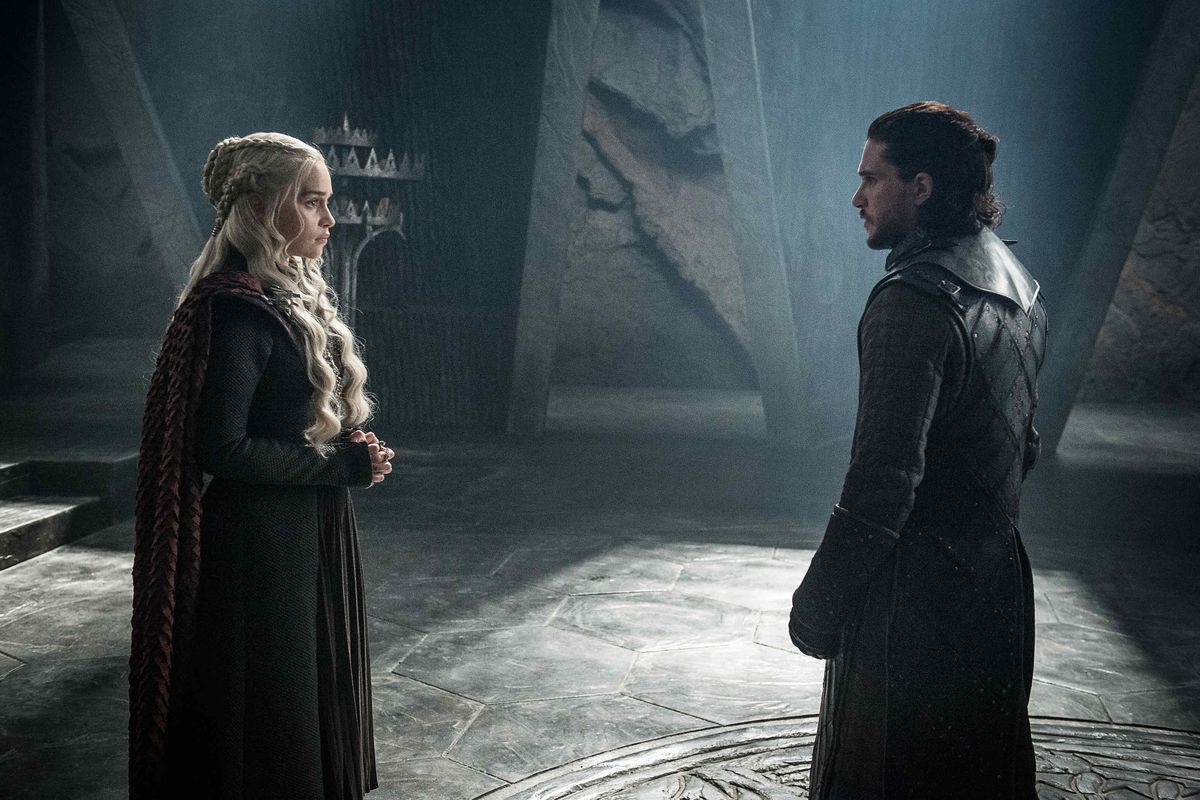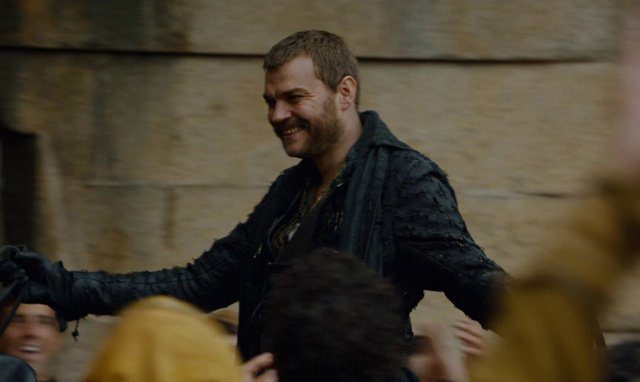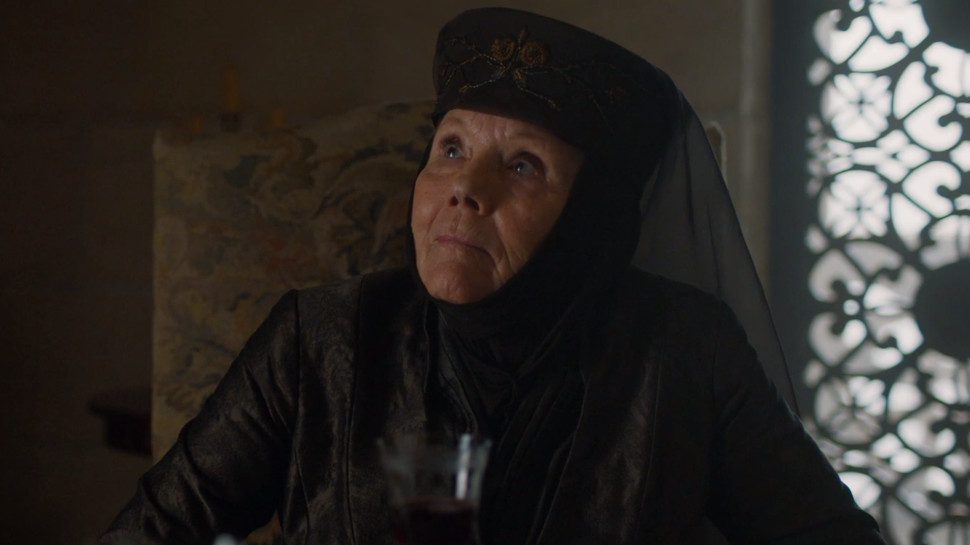“The Queen’s Justice” is thrilling proof that at the height of its powers, few shows can rival Game of Thrones for political intrigue. This is an episode of the show that House of Cards wanted to before it devolved into pulp. “The Queen’s Justice” is an apt name for this installment, as it focuses on the women who rule different corners of Westeros; the added bonus is that the actresses on Game of Thrones are utterly terrific.
The episode begins with a long-awaited meeting, and it’s exciting to see Jon Snow and Davos Seaworth arrive on the shores of Dragonstone. As fun as it is to get all these characters together – their first points of contact are Tyrion and Missandei – it’s also bittersweet because it means the show is ending, and soon (there are now only eleven episodes left of the whole series). Jon’s meeting with Daenerys is tense, and the two feel each other out like boxers, each unsure of the others’ intent or legitimacy. In Jon, Daenerys sees a stubborn Northerner, who, technically speaking, is in open rebellion against the rightful queen of Westeros. Jon sees in Daenerys another intransigent ruler who refuses to believe his stories about white walkers and the Night King, to the ruination of them all.
It’s a remarkably well-written scene, and Kit Harrington and Emilia Clarke clearly relish the chance to get two fan favorites in the room, sparring with one another. If they had immediately hit it off – or jumped into bed, as seemingly the whole Internet wants and expects them to do – the scene would feel like a letdown. Benioff and Weiss avoid that by having both Jon and Daenerys stand firm in their convictions, which is what we’d expect from two characters like these. They’ve both been through a ton of shit, and Clarke and Harrington both play it differently. Daenerys is determined to never let anyone fuck with her again, and Jon has a haunted thousand-yard stare that alone should prove he’s telling the truth. It’s a powerful scene, and a great way to start the episode, and the best part of “The Queen’s Justice” is that it gets better from here.
Before we move on, a word about Tyrion. Since the cast of GoT has contracted, Peter Dinklage has become more of an ensemble player, but here he commands the screen with the same ease he’s shown since day one. This is the most screen time Tyrion has had all season, and we get to see a lot of sides of him. There’s the decent man, who affectionately greets Jon as “the bastard of Winterfell,” before asking about Sansa’s health and making sure he knows that the marriage between him and Sansa wasn’t consummated, nor was it his idea. And we get to see the peacemaker, who tries to keep the meeting from escalating to threats or bloodshed, and coaches Daenerys on how to make Jon into an ally. You can tell how much Benioff and Weiss love writing for Tyrion.
King’s Landing is growing pulpier by the minute, and GoT is better for it. Cersei becomes drunker on power every week, which culminates in her sleeping with Jaime and not caring who knows. She’s found a kindred spirit in Euron Greyjoy, a strutting peacock of a villain who revels in his evil in a showy way we never saw with Tywin Lannister or Littlefinger. He even asks Jaime for advice regarding what Cersei like in bed. The Dorne arc is mercifully concluded here, and while I still maintain that the Sand Snakes are this show’s greatest blunder, the resolution was suitably horrifying. With Ellaria and Tyene in chains, I was worried the scene was going to end in more violence against women – the presence of the Mountain is enough to imply brutal sexual violence, which is arguably how Septa Unella met her end last season – but it becomes a chilling insight into how deep Cersei’s well of cruelty is. (Contrast this with a later scene, when Jaime has to mete out justice on Cersei’s behalf.)
Sansa is running the North with aplomb; her steely resolve only weakens when Bran returns. Isaac Hempstead Wright does some great facial acting here, as Bran is all but unmoved by his reunion with his sister. Like Arya, Bran is far removed from humanity, but I’d argue it goes even further with Bran. He’s a different entity now, and could end up being the most powerful person on the show, which would make sense conceptually because it was Jaime’s attempted murder of Bran that set everything in motion to begin with. Sansa is isolated no matter where she is; Jon is gone, Bran is a walking ghost, Arya is presumed dead. She has no one to turn to but Littlefinger, who tells her to consider all angles: “Everyone is your enemy; everyone is your friend.” It seems as if he’s playing the hits; one wonders how often he gave Robert or Cersei similar advice. Game of Thrones either ends with him on the Iron Throne or dying a horrible death.
What I’m really enjoying about this season so far is that it breaks up talky episodes with intense battle sequences. (The end of last week’s “Stormborn,” for instance, was stunning.) Director Mark Mylod, a Game of Thrones veteran, does great work with the Unsullied siege of Casterly Rock (to be honest, after seven season of hearing about but not seeing Casterly Rock, I was a bit underwhelmed); watching them hack their way through Lannister soldiers while Tyrion spoke in voiceover was just great filmmaking. It was also a good way to show that our heroes are truly screwed, as Euron burns the Unsullied fleet, stranding them, while Jaime takes a contingent of soldiers to Highgarden (also underwhelming; we see almost none of it).
For an episode with more plot than any this season, and a few battle scenes (we only really see the aftermath of the attack on Highgarden), it’s something of a masterstroke to end “The Queen’s Justice” on such a quiet scene. When Jaime comes upon Olenna Tyrell, waiting patiently for him, we know she has to die; the fun and agony of Game of Thrones is wondering how it’s going to happen. Jaime kindly poisons her wine, not wanting to subject her to Cersei’s more profane ideas. And it’s here that Diana Rigg runs away with the whole episode.
It’s hard to “win” a death scene. It’s almost impossible, because no matter how well-timed your quips, you still die at the end. But that’s what Olenna does here, dispensing her own kind of justice (the title might refer to her; Olenna’s nickname is the Queen of Thorns, after all). After telling Jaime that he must know that Cersei is mad, she quaffs the poisoned wine, and starts taunting him about Joffrey’s death. “Tell Cersei,” she says. “I want her to know it was me.” And that’s the worst part of this for Jaime. He’s robbed his sister of revenge, but he doesn’t get to avenge Joffrey either. If he tells Cersei he gave Olenna an easy way out, he risks her considerable wrath. In one sentence Olenna manages to drive a wedge between Jaime and Cersei; with her dying breath she weakens his resolve, and possibly the whole Lannister war effort. Mylod cuts before we see Olenna slump over in her chair; she sits upright while Jaime all but runs out of the room, suddenly filled with terror and self-doubt. He’s just killed a woman and somehow she looks like the victor.
4.5/5



